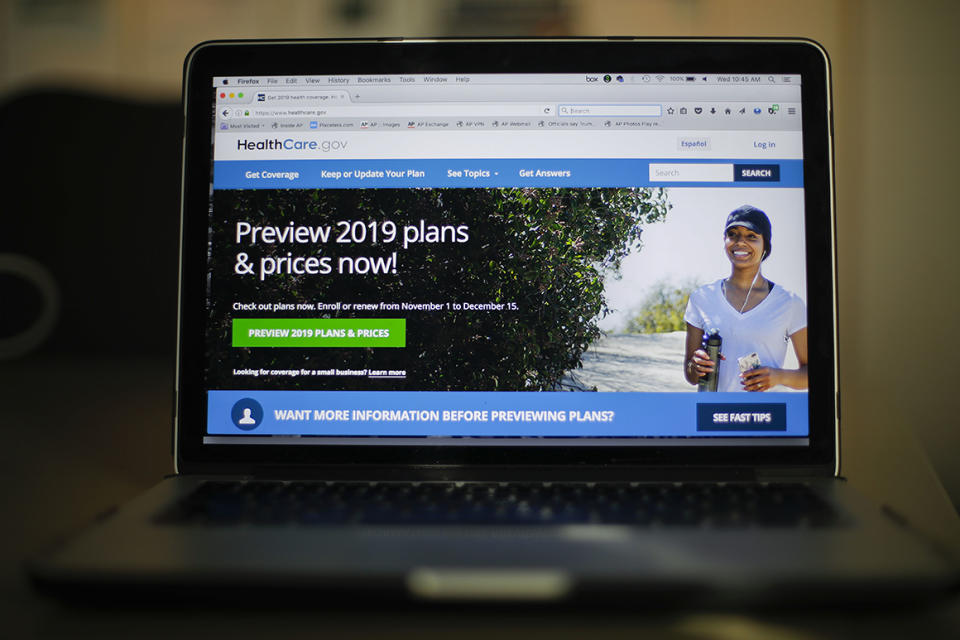Biden vaccine website pledge invokes the ghosts of Obamacare
- Oops!Something went wrong.Please try again later.
- Oops!Something went wrong.Please try again later.
Almost a decade ago, Jeff Zients was asked to rescue Obamacare's online sign-up system — a task that proved pivotal to the presidency.
Now the head of the White House Covid response team has six weeks to roll out another website to help millions of people sign up for coronavirus vaccines and make good on President Joe Biden's pledge to get life back to something close to normal by midsummer.
He'll have to develop a fully functioning, one-size-fits-all national online appointment system for vaccine-seekers who now are spending hours on end dialing phone numbers or hitting “refresh” on websites trying to get an appointment. With more than enough shots expected for every adult in the U.S. by May 1, Zients will have to design a virtual on-ramp that can handle millions of newly eligible people seeking appointments without crashing.
Zients — along with his longtime wingman Andy Slavitt, now senior advisor for the White House Covid response team — led and oversaw the 2013 effort to fix the calamitously broken HealthCare.gov. After a very wobbly start, sign-ups exceeded expectations in that first year.

“Jeff has the capacity both to analyze what needs to be done and make sure all the pieces come together,” said former Health and Human Services Secretary Kathleen Sebelius, who was in office when HealthCare.gov crashed and when it rose again.
“Once the analysis was done that identified where all the glitches were, he put together the spreadsheet, the timetable, the drive line, he got the right people in the right places and got the job done,” she added. “And Andy Slavitt was the coordinator of that effort — the kind of get up in the morning and think of all the pieces of the puzzle and coordinate them guy.”
The vaccine scheduling effort is in its early stages, and an HHS spokesperson said the department hasn’t yet decided how ambitious it will be.
But it will be based on the government’s existing VaccineFinder.org website rather than be built from scratch — a move aimed at making the process more efficient and avoiding some of the pitfalls and complexities that doomed HealthCare.gov’s rollout.
The VaccineFinder site was originally created during the 2009 H1N1 flu outbreak out of a partnership between the CDC and Boston Children’s Hospital. The Biden administration repurposed it earlier this year to allow people to enter their zip codes and find nearby pharmacies and other Covid vaccine sites near them. The site is also able to direct users to the right place to make an appointment, if that external resource exists.
While federal officials initially expected the tool to work across just a handful of states in its first weeks, pharmacies ended up sending far more data about vaccine inventories than expected to the health department over the last several weeks, allowing for a faster expansion of the site.
HHS will continue to collect such data and funnel that into the website. It is also weighing how and whether to collect similar information from other locations, like mass vaccination sites and individual health providers.
“We need to make it easier for every American to get vaccinated,” Zients said at a White House briefing on Friday.
“Too often it’s too difficult, too time-consuming, too frustrating for people to identify where vaccines are available and where to schedule an appointment," added Zients, a business executive who held several posts in the Obama administration.
Any national website will need to aggregate slots across providers, flag patients who make multiple appointments at different sites and make sure everyone is eligible to get a shot in the place they’ve booked, said Bob Kocher, a health IT expert who served as a health and economic adviser to President Barack Obama and is now a partner at Venrock.
And although the shots are free to people, insurers and health plans will be billed, meaning the registration sites have to collect that information, too.
One expert on the states, who didn’t want to be quoted by name without knowing more about the White House’s specific plans, expects a “no wrong door” portal — one site that any person can go to, and then get directed smoothly to the right local sign-up tool.
The problems with existing sign-ups are widespread, leading some public health departments to change vendors or systems midstream. Massachusetts, for instance, has gotten Google to help out after its system suffered multiple crashes.
A Kaiser Family Foundation poll of seniors found about one in six respondents tried, but failed, to secure an appointment to get a shot. Numerous seniors had looked for information but found it hard to find.
“For some populations who don’t have access to the internet or don’t have time, to wait online and surfing different sites, calling this part of the state, that part of the state, that’s going to disadvantage people who don’t have the technology, don’t have the time,” said Jen Kates, a public health researcher at the foundation.

